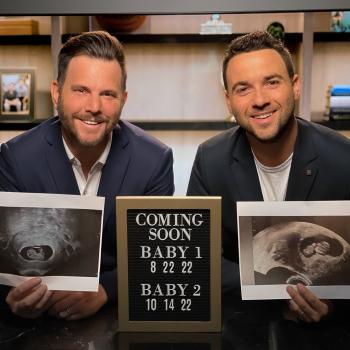Lauren Daigle has been the subject of much debate as of late due to her recent answer to the question of the sinfulness of homosexuality:
“You know what, I can’t honestly answer on that… I have too many people that I love that are homosexual. I don’t know… I can’t say one way or the other. I’m not God, so when people ask questions like that, that’s what my go-to is. I just say, ‘Read the Bible and find out for yourself and when you find out, let me know, because I’m learning too.’”
While many wish to give Lauren Daigle the benefit of the doubt, under the pretense of her answer being noble because she admits to her progression of learning, I have sincere doubts to her genuineness. Furthermore, I would argue that musicians such as Lauren Daigle, meaning those who purport to lead others in praise to God, should have a rudimentary understanding of the Bible in order to do so. There shouldn’t be questions on basic teachings of Scripture, but rather, confidence enough to lead others in such truths.
One might argue that people who affirm homosexuality can argue from the Scriptures to prove their point – and this is true. Surely, people can use the Scriptures to affirm all sorts of ungodly nonsense, yet the crux of the matter is not if someone is able to do so. It’s not even if they are able to do so skillfully. The crux of the matter is in the question: What does the text say? In this case, it is painfully clear and has been so for millennia within the historic church.
However, my personal suspicion is not that people are all that unclear on these things. After all, the apostle Paul unflinchingly states that the deeds of the flesh are evident, or obvious to all (Gal. 5:19). Paul, being a good Jew, would have no lack of clarity on the Old Testament’s prohibitions against homosexual relations. Furthermore, he was abundantly clear, for though he says the deeds of the flesh are evident, he then goes on to list some of these vices (Rom. 1:29-31, 13:13; 1 Cor. 5:10-11, 6:9-10; 2 Cor. 12:20-21; Gal. 5:19-21; Eph. 4:31, 5:3-5; Col. 3:5; 1 Tim. 1:9-10; 2 Tim. 3:2-5; Tit. 3:3).
We are not dealing with adiaphora; we are not dealing with the deep things of God here. This is teaching so rudimentary that people inside and outside of the church understand full well the implications of sexual perversion. The monumental shift in Western culture to embrace homosexual relations is not due to a lack of clear teaching on the matter. In that same vein, orthodox Christianity has not shrouded proper, biblical ethics on marriage, sex, etc.
Thus, the question is not one of clarity or meaning, but authority. The ultimate question is if the Scriptures have authority in regard to sexual morality – not if they allow homosexual relationships in any capacity – but do they have jurisdiction to tell you and I the proper, holy, and good expression of sex. If we claim to be the people of God, which vicariously means we are a people of the book, we would do well to accept Scripture’s teaching. Rather, a charge toward the lack of clarity on teachings such as this is due to the fact that people actively suppress the truth in unrighteousness (Rom. 1:18).
We would give no quarter to the person who says with regard to murder, “I can’t honestly answer that one way or the other. I’m not God.” Or, to use a less extreme example, we would not give a free pass to the man who, after beating his wife, says, “You know what, I can’t say whether or not what I did is sin, I’m not God.” The point here is to simply demonstrate that we would draw that line very quickly if other, less socially acceptable sins, were inserted in place of the topic of homosexuality.
We ought to expect more from those within the Christian music industry, namely because they embrace the moniker “Christian”. The term actually means something and implies that we will follow the teachings of our Lord, which were delivered to the saints once and for all (Jd. 1:3). We ought to be able to expect those who claim Christ to stand with courage as they proclaim the truth of Scripture to a dying world. Why? That type of courage is precisely what makes one a Christian. They are not ashamed of the gospel (Rom. 1:16); they are not ashamed of Christ and His words (Mk. 8:38; Lk. 9:26) and thereby, they shall not be ashamed before Him at His coming (1 Jn. 2:28).
Yet here is precisely where I turn to the reader and simply beg you to expect more of those within the Christian music scene. Expect them to have a robust theology. Expect them to be able to articulate the gospel – every Christian should be able to do so. Expect them to be able to stand upon basic principles and teachings from Scripture. If they can’t or won’t, perhaps it is time to re-evaluate who you allow space in your heart to lead you before the throne of God in praise. This is no trifling matter, to say the least.
While we might not often think of it, the words which come out of our mouths in praise, whether before the Lord corporately or individually, are of great significance. Routinely, one finds corporate worship to be an exercise wherein the people of God greatly rejoice in His truth. There is no dichotomy between the truth of Scripture and one’s emotional ascent to their Creator. Rather, one finds the harmony of truth and emotion, as the worshiper embraces the promises and proclamations of their King by faith and entreats Him with petition and praise.
It should go without saying that if you can’t pin down something as basic as proper sexuality, you have no business leading anyone in songs before their Creator. The reason being is fundamentally bound within the fact that if something as basic as this eludes you, why on earth would it be appropriate to then lead others to bask on the deep things of God? If we can’t accurately navigate the shallows, how might we then plumb the depths of His mercy, splendor, majesty, aseity, and yes – even His great wrath, as the Psalmists do?
I was not all that shocked to see Lauren Daigle vacillate on homosexuality, mainly, because a ton of Christian musicians have done so in the past and will likely continue to do so. It has sort of become the industry standard to start out as a Christian music artist, gain notoriety, and slowly shift toward the secular audience one has desired all along. Yet the crucial part of doing so is acceptance within the broader culture, and what easier way can a professing Christian find acceptance than by playing coy with regard to homosexuality?
We ought to expect better within the Christian music industry. There ought to be a heartfelt desire to see those who genuinely love the Lord succeed, rather than propping up those whose emotionally charged, yet theological vapid songs, enter into the confines of our hearts. The problem though isn’t the Christian music industry – it’s the Christian community. The same reason why unorthodox musicians succeed within the Evangelical community is the same reason theologically inept pastors become celebrities. By and large, the Evangelical church has lost her mooring because she is no longer resiliently anchored to the truth of the Scriptures. We ought to expect better of Christian musicians, but this will never be a reality until we start to expect more of ourselves.













